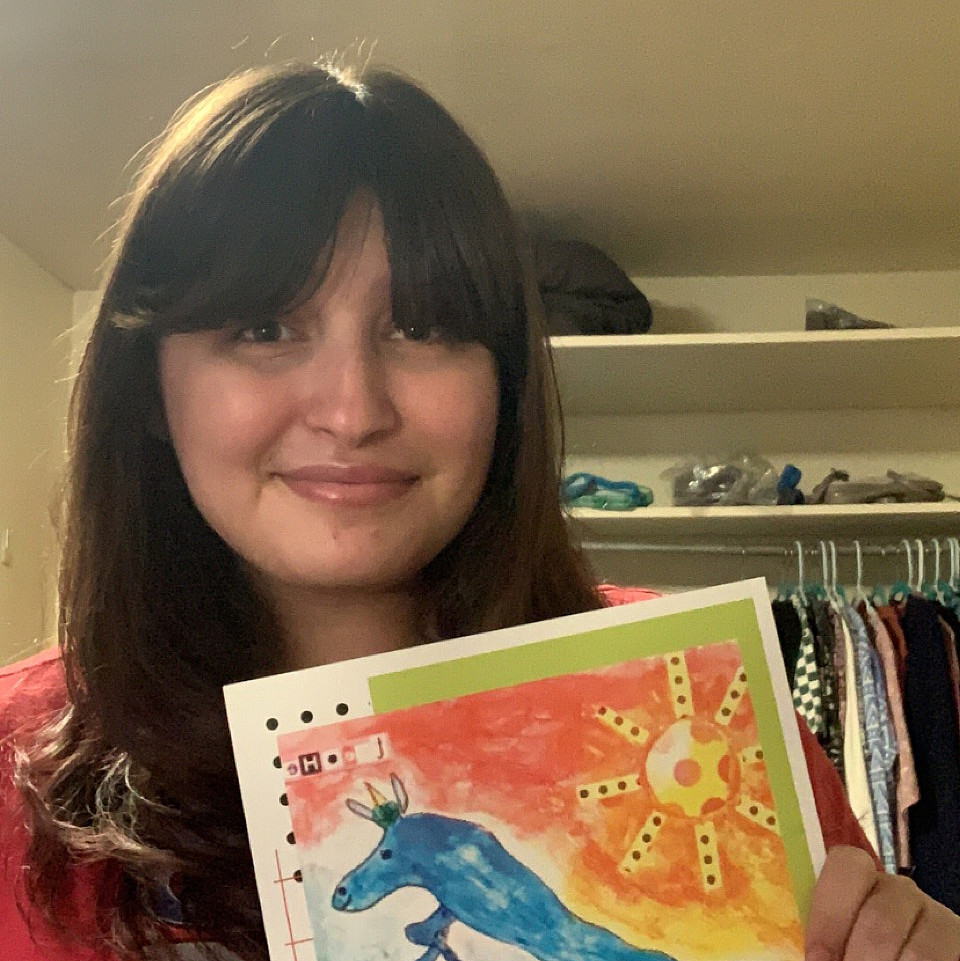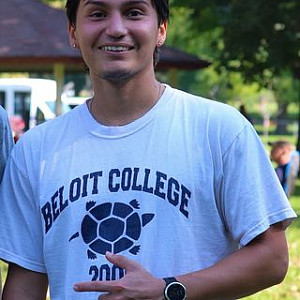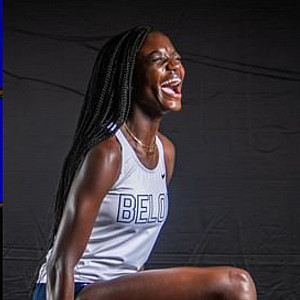How to get published in college: A Q&A with Sydney Moses’25
Creative writing and anthropology double major Sydney Moses’25 never saw herself as a poet, but after a workshop with English professor Chris Fink and encouragement from Mackey Chair Lynda Barry, she decided to send a piece to a few literary journals. Now, she has two poems published, and she won’t be stopping anytime soon.

What has been your motivation for writing these poems and sending them out?
I’ve always really liked writing, but I’ve mostly been a fiction writer, so I never really thought of myself as a poet. In one of [English professor] Chris Fink’s classes, we were writing poems, and I just happened to write one I kind of liked and thought, “Why not try to do something with it?”
After that one got accepted [to Parakeet], I thought, “Maybe I could do poetry.” It’s kind of like writing songs, which I don’t do because I can’t sing. It felt like when you’re a kid and you want to be Britney Spears and you try to write songs for the first time. Poems typically have the shorter lines, so it feels more like a song, and sometimes they rhyme, so it reminds me of music. When you read them, they have sort of a tune to them.
How would you describe your poetic style?
I tend to write my poems like I write my fiction — it’s a long train of thought and I put myself into the shoes of a character, as if it’s more like a book. Poetry feels so free, whereas when I write books, I tend to put a lot of pressure on myself to outline. When I write poems, it’s fun, like, “let’s see what’s going to happen.”
You’re taking Lynda Barry’s Mackey Workshop class now. What has that been like?

She has a lot of these tricks — when you’re writing by hand and you don’t know what to write, write “tick, tick, tick” to keep your hand moving so that you don’t lose your train of thought. That’s been really helpful. Even when I type on my computer, I’ll just hit the F key over and over until something happens so I don’t just stare at a blank screen. So that’s been the biggest takeaway from the class: finding ways to keep the momentum. She has a lot of exercises giving you a word or drawing yourself as a vegetable — really quirky things to help inspire you without putting a lot of pressure on you to draw the next Mona Lisa. They’re casual and she usually times them for a minute or up to five minutes, so they’re really fast, which is also helpful because it’s whatever you can do in a minute — if it’s good, it’s good, and if it’s not, it’s just one minute and you can move on.
You’re one of the founding members of the Aardvark Authors writing club. How has that gone this year?
I think the club has been fun. It’s definitely been a lot of trying new things and seeing what works because this is our first year doing club leadership. I really enjoyed the 24-hour writing challenge — I actually managed to reach my goal and stay awake this time! I’m really excited for all of the Lynda Barry workshops [hosted by the club]. We’re also doing a trip to the zoo to write about that experience, because the zoo in Madison is free and there are aardvarks, so we’re going to see those and see if that inspires anyone.
Every other meeting is an event or other formal activity, and the other meetings are workshops where people can bring in their pieces and we can all look at them. We have such a diverse range of genres. It’s always cool to see all the interesting things people bring to the club and how they do their outlines and planning. It’s fun to talk about. We can all be nerdy.
Have you drawn inspiration from other classes too?
I’m in Chuck Lewis’s novella-writing class, where I’ve been continuing the [fantasy] book that I’ve been working on for the last six years. It’s undergone a lot of total overhauls. It’s been really helpful to take the class with Chuck and get another set of eyes, because he’ll read a sentence and be like, “What does this character mean?” and we’ll talk about it for ten minutes. That class has been really helpful to brainstorm and see what other people think when they read things. Anytime you write something, you have the narrow field of whatever your own life has been like.
This year especially, I’ve really come to enjoy reading my own writing. It’s kind of fun to reread [and think], “Why did I write that?” Not in a critical eye, but more in an intrinsic way of trying to figure out what I was trying to do with this plotline or this character, as opposed to judging myself for writing something that isn’t perfect.
For folks interested in publishing, what has your process been like?
I definitely think using stuff you write in class can be a good start, because a lot of the time in the creative writing classes here, that stuff is workshopped and you have other sets of eyes and get a feel for what works and what doesn’t. If you want to publish something, just do it. The worst someone can say is no, and then you just try again.
Something that I’ve learned in Lynda Barry’s class is that you’ve got to be brave. I was very scared to draw. I remember on that first day, she had us copy a picture she was drawing and I was so stressed, and now it just feels like scribbling to see what happens. I feel like that class really loosened me up. I think going for it and trying to see what happens is really the best way, in my experience, though my experience is just a couple of months.
For poems specifically, reading other poems that those magazines publish [is important], because every magazine has a different vibe or aesthetic. Sometimes you really like the content of one magazine, but your poem doesn’t really fit there. Browsing — window-shopping the poems — is a good excuse to read poems you might not have read otherwise. I came across a really funny one yesterday making the case for brussels sprouts and it was really funny! I never would have read it if I hadn’t been reading an old archive.
Where are you hoping to take your writing from here?
I’m definitely going to keep submitting while I can. I’m still pretty new to poetry, so I don’t want to write stuff and have it feel forced. Whenever one comes to me, I’ll write it and see if there’s a place that I think it would fit. But I do also really want to move forward with my book. Just yesterday in Chuck’s class, I came to a realization, and I think it might be time for a rewrite — again.


